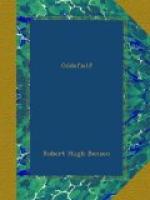Well; when he had done, we talked over it a while. I professed myself very well satisfied with what I had heard; and I put forward an opinion that it would be far better to delay no longer in the West. A demonstration there might lead to alarm here; troops might be withdrawn here, and relieve the pressure, and thus make possible a further demonstration in London. I spoke, I think, with some eloquence, remembering however that they all looked on me with the same confidence that I had in them—and no more: that is, that they believed me a liar. My observations were received with applause, very well delivered.
It was growing pretty late by the time we had done; yet before we went I had learned one more piece of news, partly through a little trap I laid, and partly through my Lord Essex’s clumsiness.
“Well,” said I, “I must be getting homewards, my Lords. I wish my Lord Shaftesbury had been here. Could I see his Lordship, do you think?—if I were to call at his town house? There is a very particular matter—”
My Lord Essex started a little. He was tired and overanxious, I think, with the continual part that he had to play before me; yet it was the first slip he made.
“My Lord is out of town—” he said. Then he paused. “You could not tell us, I suppose—”
I affected indifference. (Was my Lord out of town, I wondered?)
“Why; it is nothing,” I said.
My Lord exchanged a look with Mr. Sheppard; and made his second mistake.
“I saw my Lord only—last week,” he said suddenly. “He wishes his address to be private for the present; but—
“Do not trouble yourself, my Lord,” I said. “I assure you it has nothing to do with our business here.”
I repeated this, I think, with a good enough manner to persuade them that what I said was true; and presently afterwards took my leave.
As I sat in the wherry that took me back to the Privy Stairs—(I had announced of course, “to the Temple")—I was preparing in my mind what I should say. I had learned a considerable amount for an evening; for the conversation I had overheard, added to what Mr. Chiffinch had told me, added to what they had all said in the parlour, interpreted and fitted together, was pretty significant.
These were the points I arranged.
First, that the visit of the Duke, my Lord Grey and Sir Thomas Armstrong to Whitehall was to see in what state the guards were in case of a surprise; and the conclusion they had arrived at was they “were not like soldiers at all” but “very remiss.”
Second, that a “demonstration” in London was very imminent.
Third, that they had won over my Lord Russell enough at least to gain the help that his name would give.
Fourth, I was confirmed in what Mr. Chiffinch had told me as to the probability of a rising in Scotland.
Fifth, I was confirmed in my view that the Duke was very deeply involved.




